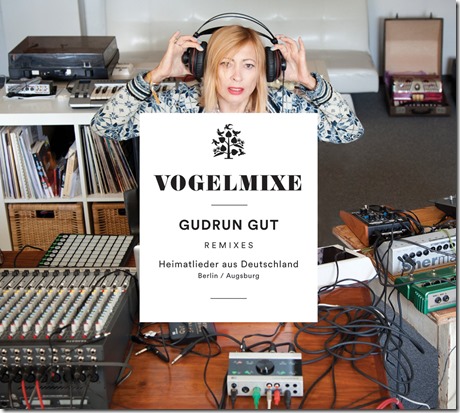Run United Music – RU18 – 3rd September 2016
Christopher Nosnibor
Gudrun Gut’s Vogelmixe is, as you may gather, a remix album. An album of traditional folk songs, recorded by contemporary artists and remixed by Gudrun Gut. Helpfully, there are two discs, the second containing unmixed versions with the traditional arrangements preserved, previously featured on the album Heimatleider aus Deutschland Berlin/Augsburg in 2015.
‘From the Top 100 to “Alternative”, most of today’s music has the emotional depth of your regular smartphone’, write Mark Terkessidis and Jochen Kühling in the liner notes. And so the inspiration behind the Heimatleider aus Deutschland was a longing for music with emotional impact and a sense of commonality, prompting a return to what they refer to as ‘“primordial” forms of singing, to folklore as an oral tradition.’ There’s a distinct logic in that. New music, however sincere, genuine or authentic is by its nature a product and is imbued with an inescapable sense of artifice. It’s always made with an eye – and ear – for public consumption, for distribution, regardless of mattes of commerciality. Traditional folk music is by its nature the music of the people. It was never borne out of a sense of commercial appeal, or even with a view to its own propagation. It has a life of its own, and that life is real life. These are songs of people, songs of the earth. There’s no way to plan or market this.
Many of the songs sound remarkably contemporary even in their original form, particularly the thrumming bass groove of ‘Marhba’, as performed by La Caravana du Maghrab. The range of styles represented provides a rare insight into German folk music unlikely to be known by non-natives. One element common to the majority of the songs is the emphasis on rhythm. Repetition and strong melodies are also a defining characteristic, with the bold harmony-led melody of bolero ‘La somber del ayer’ demonstrating a remarkable level of complexity which contradicts popular notions of folk songs being somehow primitive or simple.
On the one hand, Gudrun Gut’s remixes are pretty brutal in their treatment of the source material. Her approach is largely centred around heavy-duty electronic sounds which take the songs a long way from their original, traditional forms. You couldn’t exactly call them sensitive or subtle. In fact, the majority of the songs are unrecognisable on every level. Yet for all the superficial violence Gut commits to the songs, she does demonstrate a real connection with them, and conveys the passion and spirit which lies at their heart. Her dubby take on ‘ZaNeYen’ works well, the weirdy electronic bleeps sounding not out of place against the pulsating bass buzz and cavernously reverbed percussion. She really goes to town on ‘Marhba’, in places reducing the track to short, intense loops against an insistent, thumping dancefloor beat, while in contrast, ‘Toma de la ca’ emerges as a more sultry, sedate groove. She does treat Heide’s ‘Ein klienes Waldvögelein’ with a remarkably light touch, leaving the acoustic guitar and vocal performance fundamentally intact and augmenting them with subtle, glitchy beats kept low in the mix, soft synth washes and small sleepy incidentals, none of which is overdone.
Ultimately, it’s Gudrun Gut’s varied approach to the already diverse range of material which proves to be the strength of Vogelmixe. Moreover, the centrality of rhythm in the originals is retained and even emphasised in the mixes, and while the nature of those rhythms is much more contemporary, it again serves to convey the essence of the music, and the way in which the original artists rendered the songs with such life for which credit is very much due. And herein lies the difference between those traditional songs and the manufactured sounds which Terkessidis and Kühling find so objectionable: the latter are the sounds of the human spirit and soul, and have endured because of this. Moreover, however you tweak them, mash them and grind them up, mix and remix them, they will always contain these immutable constants which resonate through all time.
